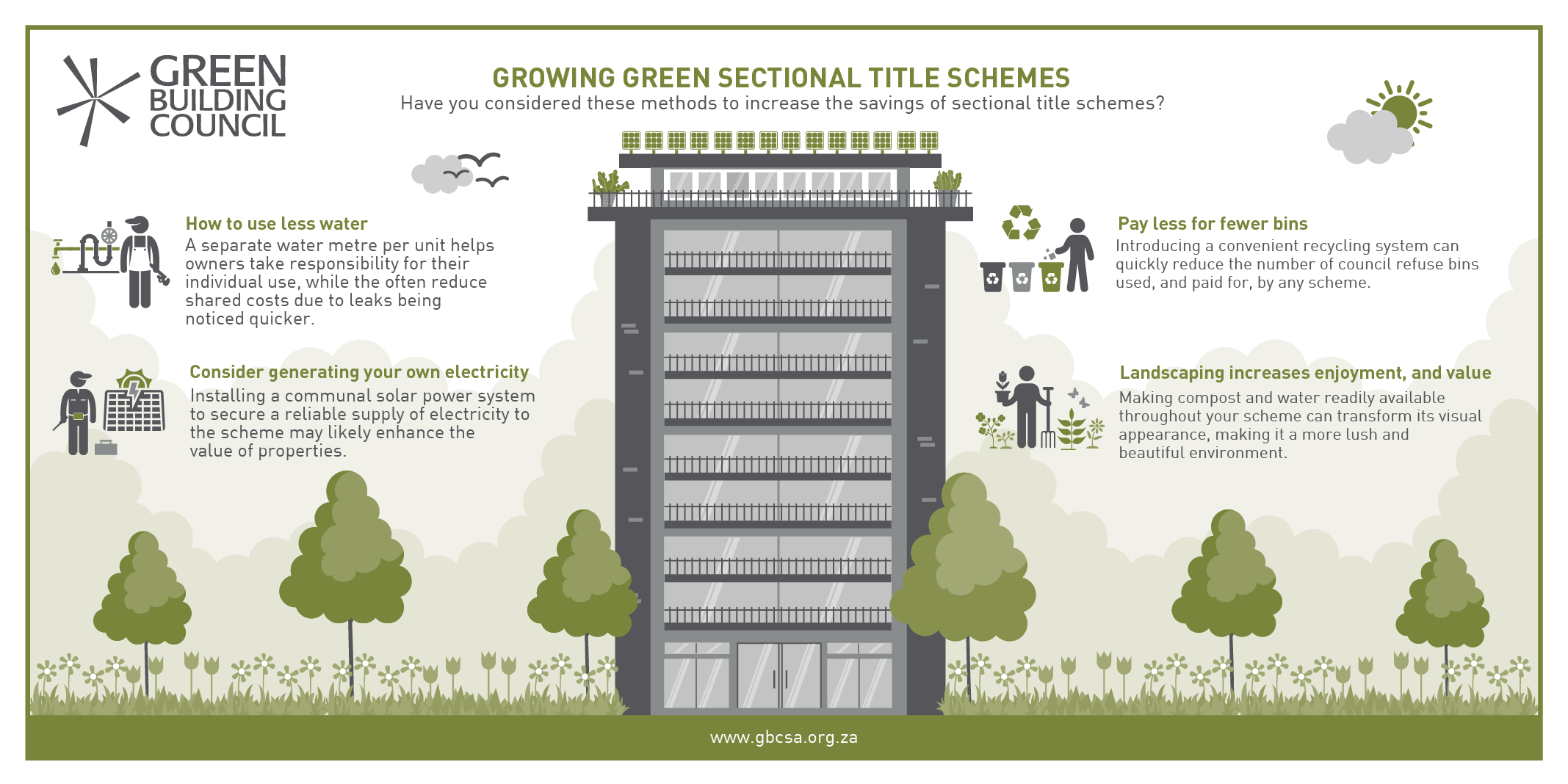
Growing green sectional title schemes
February 29, 2020
Rising utility costs, paired with competitively priced sustainable tools to supplement municipal electricity and water use, mean that sectional title schemes are becoming a more viable marketplace for the green building sector.
While each scheme has unique characteristics, their expenses are often centred around meeting similar needs, namely: electricity and water use, refuse removal, building maintenance and landscaping.
Sectional Title schemes in South Africa are currently expected to include more than 700 000 homes, with an estimate value of R655 billion and which accommodate more than 6 million people.
And these schemes are required by the Prescribed Management Rule 22 of the Sectional Title Schemes Management Act to have a written 10-year maintenance, repair and replacement plan for the common property which is updated each year, as well as a reserve fund that must be used to implement “the maintenance, repair and replacement plan of the body corporate”.
This decade-long maintenance planning cycle provides a long-term view from which to examine installation costs and balance them against subsequent maintenance costs – such as installing rainwater tanks and an irrigation system, or the ability to convert sunlight into electricity to protect against increasingly higher priced electricity fees and sudden outages.
Have you considered these methods to increase the savings of sectional title schemes?
How to use less water
Using less water in private or public areas can create considerable cost savings. “A separate water metre per unit helps owners take responsibility for their individual use, while the often reduce shared costs due to leaks being noticed quicker, and the common understanding that water is not a free resource,” said Pearl Scheltema of Fitzanne Estates.
Roof gutters can channel rainwater into tanks, which when mounted on a platform usually provides enough pressure to run a hose or irrigation system, or fill the pool.
Stick to water-wise indigenous plant species. They are hardy and often evergreen (and while watering, encourage them to drop their roots deep to become even more drought resistant by watering well twice or so in the week, instead of light, frequent watering).
Consider installing a borehole or well point for garden irrigation.
Automated irrigation systems are very efficient, and can be set to work while it is cool in the very early mornings or late evenings. And they often include rain sensors to stop it watering just after rain.
Install and use a pool cover for the communal pool.
Consider generating your own electricity
Installing a communal solar power system to secure a reliable supply of electricity to the scheme may likely enhance the value of properties. But, as with any shared project, following the correct procedure is vital.
“Projects on common property with shared costs require notifying owners. If a special meeting is called it will require a quorum and, to be successfully passed, a supporting vote of 75% of those present. Financing projects like these can be done through a loan to the sectional title scheme and be paid back out of quantified savings, however this also requires a special resolution,” Scheltema notes.
The electricity draw used by lights in common areas can be dramatically reduced by installing LEDs, timers and movement sensors.
Pay less for fewer bins
Introducing a convenient recycling system can quickly reduce the number of council refuse bins used, and paid for, by any scheme.
One method to do this is to encourage occupants to separate out all recycling (paper, plastics, metal and glass), food waste for composting and normal household rubbish in their unit. Then, if the scheme has the services of a caretaker who can safeguard the waste stream, they will be able to channel the appropriate waste streams to the correct place. Alternatively residents will need to ensure they do not mix up their refuse in the communal bins.
As it grows in popularity the scheme’s recycling will either need to be dropped off at a local depot once a week, or a company hired to collect it.
Landscaping increases enjoyment, and value
Kitchen and garden waste is simple to compost and the resulting mulch reduces moisture loss and functions as an excellent fertiliser.
Worm farms are becoming more common and create a very high-quality compost, including from dog poo. We recommend that dog poo compost is only used on ornamental plants, and not edible ones. Also we’ve heard to not feed your dedicated dog poo worms any tasty kitchen scraps, or else they opt not to touch the poo (can you blame them?!).
Making compost and water readily available throughout your scheme can transform its visual appearance, making it a more lush and beautiful environment. It is common knowledge that pretty gardens and green spaces enhance property values.
“It is through these iterative environmentally friendly steps that sectional title schemes will see the accumulative benefit of tying their compliance of the Sectional Title Schemes Management Act to green and sustainable improvements,” said Scheltema.






